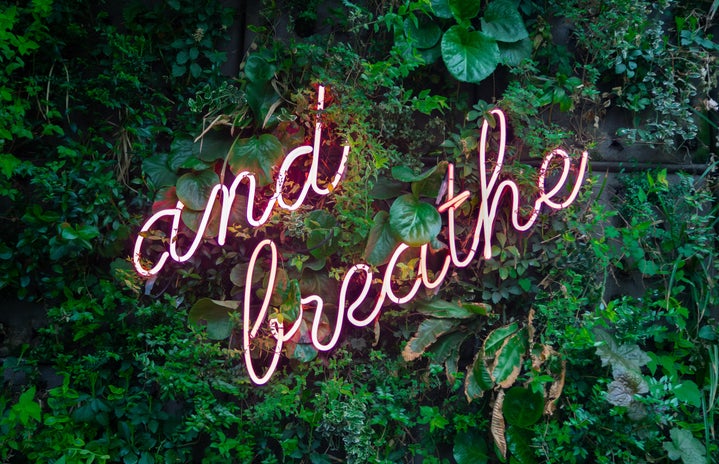After experiencing the entirety of my college career thus far in a global pandemic, I’m sure that I’m not alone when I say that adapting to this new way of life has taken a toll on my stress levels, anxiety, and overall mental health. As a young adult who is constantly exposed to the media, it is often difficult to shift my focus away from all the pressure that this age entails. Old and new stressors are always at the forefront of my mind: maintaining high academic standing, making enough money to buy groceries and pay for gas every week, keeping up with my social life, participating in extracurriculars, setting aside time for the gym, preparing healthy meals to nourish me, staying in touch with my family; the list really does go on. Over the past few semesters as an undergraduate, I have consistently tried to find new techniques to manage these responsibilities while keeping my cortisol low (ish). I have listened to health and wellness podcasts, read self-help books and research articles, and followed along with social media accounts to educate myself and find inspiration for new stress managing habits. Repeatedly I have heard these influential people talk about the mind-body connection and the immense benefits that this concept can harness.
The mind-body connection means that you can learn to use your thoughts to positively influence some of your body’s physical responses, thereby decreasing stress. For example, if you start to think of a time when you were happy, grateful or calm, your body and mind tend to relax. Regardless of how you choose to work towards strengthening this connection, staying consistent with this practice has the potential to decrease anxiety, enhance sleep, strengthen the immune system, and increase your sense of control and overall well-being. As someone who would describe themselves as a chronically stressed insomniac, this is something that is very intriguing to me. The goal of calming and relaxation exercises is to help change the way you perceive a situation and react to it – to help you feel more in control, more confident or secure, and to activate healing processes within the body by becoming more aware of any tension, anxiety, breathing changes, or other symptoms that you recognize as being caused or worsened by stress. Simply setting a few moments aside each day to practice these exercises may help to “quiet” the mind and help the body become more relaxed.
With this knowledge, I decided to set a personal goal for myself to implement any form of meditation with a total duration of at least fifteen minutes into my everyday routine for an entire month. This meditation may include doing a body scan when I wake up or before I go to bed, trying out new breathing exercises, listening to mindfulness or loving-kindness meditation on a walk, or practicing yoga. Allowing myself a wide range of options, retrospectively, made it much more attainable to keep this promise to myself. Additionally, having different activities allowed me to continue to listen to my body each day and find an activity that I did not get bored of after the first week. Despite my efforts to keep this goal within my reach, I know all too well that life hardly ever goes to plan. As I progressed further into the semester and added more to my to-do list each week, it was sometimes difficult to squeeze in and prioritize just a few moments with myself and my thoughts. Regardless, my hope is that I will continue with the meditation exercises that I find to be the most helpful well beyond the time frame that I have set for myself.
After holding myself accountable for my goal for an entire month, I was pleasantly surprised that I was able to stick to my plan and practice some form of meditation or mind-body exercise every day. The first week that I began implementing this practice into my schedule, I had some difficulty fully immersing myself in the meditation and getting to the state of calmness that I wanted to achieve. Although I did not fall short of my goal within these first seven days, I did not immediately see a change in my stress levels, sleeping habits, or overall wellness. As I stayed consistent and moved into the second, third, and fourth week of this project, I started to notice subtle improvements with the problem areas that I identified before creating this challenge for myself.
Here’s how a month of meditation made an impact on my daily life:
I Became a Better Sleeper
I found that meditating in the evening or before bed worked best with my schedule, and it enabled me to transition into a deeper state of relaxation and fall asleep much quicker than I usually do. I often struggle with a racing mind and intrusive thoughts that cause me to lay awake for hours even when I am exhausted. This prevents me from feeling well-rested, and it impacts my entire days and weeks. Listening to a meditation in bed with the lights off created a calm environment that supported the feelings that were evoked by the wisdom and affirmations of the meditation that was guiding my thoughts. In about fifteen minutes, I was in a state of relaxation that made falling asleep much smoother and more natural. I no longer struggled with being kept wide awake by made-up scenarios and unwanted thoughts once my head hit the pillow, and I woke up feeling more refreshed.
I Had Less Brain Fog
Brain fog occurs when you can’t see or think clearly, and this is more likely to happen for me when I find myself juggling too many things. When I try to balance the demands of all aspects in my life without taking the time to be alone and recharge, I have a hard time focusing. Meditation is the perfect antidote because it helps me tap into what my priorities are for the day, week, or even month. When I am connected to myself and not chasing every distraction, I can react from a more conscious place with an improved focus on what truly needs my attention at any given moment. The common causes of brain fog are anxiety, stress, new medications, depression, or simply being so busy that the mind becomes too full of information, too overwhelmed, making it impossible to see things clearly. For me, meditation helped me identify and work to alleviate these signs and symptoms and force me to slow down.
I Felt More Productive
I’ve learned that taking time to be still and simply be alone with my thoughts is both permissible and necessary if I want to create the best work possible while still meeting the endless deadlines that are on my horizon. As someone with a Type A personality, it is sometimes hard for me to accept that I don’t need to constantly be doing something, going somewhere, or achieving some goal in order to feel like I’m spending my time wisely. In reality, taking a few moments to step away from my to-do list is more productive than the extra minutes that I would spend working on it. After I take a meditation break, the tasks are far less daunting and seem to feel less urgent and stressful as they did before. I’ve realized that being in tune with myself and clearing my mind from any other thoughts or worries is an okay place to be, and it allows me to be more efficient with my work after taking a small break for my mental wellbeing.
I Started to Love Yoga
Going to yoga at least once or twice a week has not only helped me mentally, but physically as well. As a very active person, I sometimes brush over proper stretching and recovery due to a lack of time. Forcing myself to slow down and work on stretching and mobility has made sleeping more comfortable and I have found that I am less sore or achy throughout the week. Also, yoga classes in a group setting have added more social interactions into my week, which is an unintended bonus. Even though I aim to find stillness and work to look inside myself during my meditation or yoga practice, being in a social setting helps me feel supported by my peers, reminds me that I am not alone, and holds me accountable for my goal.
I Became a Less Anxious Student
Using meditation to de-stress and ease my mind throughout parts of my day that are typically more stress-inducing helped me feel less anxious and worried about my performance. Specifically, with tests and quizzes, the meditation beforehand made thinking and focusing less problematic throughout the timed sessions. Although I mostly noticed a difference when taking exams, I also felt more confident during interviews, at work, and during my simulation labs and clinical rotations that require complex skills and critical thinking and problem solving as a nursing student.
By the end of this challenge I felt much more comfortable with meditation, and it started to become a concrete step in my morning and nighttime routine. The techniques that I have developed throughout this past month have supported my evolving self-image and ability to notice triggers in my life and how to prevent them from increasing my stress and anxiety levels. Being more in tune with my inner self has been an exhilarating and eye-opening experience that has reminded me of the importance of self-care and mental hygiene. Taking even just five minutes out of your day is a small sacrifice to make for such great benefits.


